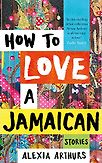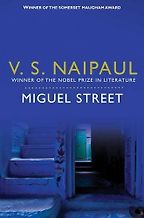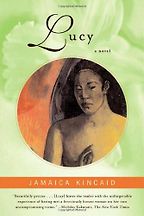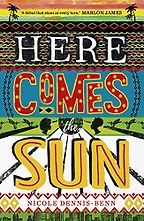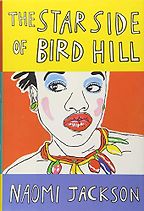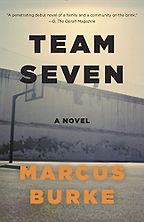The nature of the Caribbean and its diaspora must have made your task of choosing five works quite hard—it’s not a national literature, of course, although historically writers from the different islands were encouraged to think of themselves as part of a group, with an almost national identity.
It was a difficult task—it reminded me of how many great Caribbean books are out there!—so I chose to approach it from a personal angle: books that have significance to me. That said, only two of the authors I have chosen are, like me, from a Jamaican background.
I’ve always felt a sense of community with other Caribbean people. Obviously there are differences between the islands, but we do have overlapping concerns, such as reckoning with post colonialism (how the influence of the colonial past still pervades our societies, from our beauty standards to the dominance of the Christian church), or complicating assumptions about the Caribbean. There’s a need to show that the Caribbean is much more than a beautiful place. All of this is reflected in our fiction.
We should say that here we’re talking about Anglo-Caribbean literature—we’ll have to leave the French, Spanish, Dutch, Hindustani veins for future exploration . . . and you skew towards US-based diaspora. This reflects your personal approach to the selection, but do you also think it’s a particularly exciting time to be a Caribbean-American writer?
I think so. Sharine Taylor recently wrote a piece for Shondaland about what she believes to be a renaissance of Jamaican writers, and I do think there’s truth to that. It’s exciting to be writing in the same literary era as people like Kei Miller, Nicole Dennis-Benn, Marlon James, Nicola Yoon and Yrsa-Daley Ward.
None of your writers stayed in the Caribbean they write about. They all left to ‘make it’ in the United Kingdom, United States or elsewhere. Is that still the established trajectory?
I don’t think so. I was in Kingston a few weeks ago, to cover a story for a magazine: an essay on ‘creatives’ in Jamaica. I spoke to people doing wonderful work in the arts, literature and food, and all of them still live in (or have returned to) Jamaica.
“I had a really intense relationship with this place that I was unable to visit, and I had to explore that through fiction”
I have complicated feelings about being a Jamaican writer who lives primarily outside of Jamaica. I think about my position a lot. Because I left when I was a child, where I live wasn’t entirely up to me. When I was 12, my family moved from Jamaica to New York. Recently, I was talking with O’Neil Lawrence, the senior curator at the National Gallery of Jamaica, about the conflicted feelings I have about being a Jamaican writer who doesn’t live in Jamaica, and his response—and I’m still thinking about it—was that Jamaica is inherently a diasporic nation, because more Jamaicans live outside of Jamaica than inside it.
He also said that it’s hard for a country like Jamaica to sustain creative opportunities for people in the arts—so sometimes we do have to leave. I don’t know if I would have been able to get published had I stayed in Jamaica, or even if I would have considered writing a career possibility. But then again, there are Jamaican creatives who still live in Jamaica, so I don’t want to diminish that experience. Jamaicans are a resourceful people.
The tension between insiders and outsiders is a theme in your work. One of your characters at one point says, “I’d always wanted to go to Jamaica as a tourist—to see the island as an outsider.” Elsewhere, there are characters who so want to be insiders in Jamaica but still get ripped off by the local market stall owners . . .
I’m interested in exploring belonging. It’s an obsession driven by my own grappling. A Jamaican writer who lived more recently in Jamaica said to someone out of my earshot, “What does Alexia know about Jamaica?” We were young writers in graduate school, and perhaps a kind of cultural authority mattered to us. Everyone has a relationship to a place, and the nature of that relationship fascinates me.
Is your desire to be invested in Jamaica the reason for the dedication in your book, “To Jamaicans”?
I’m surprised by how many people have asked about the dedication! I’ve heard from readers who are touched by it. Initially, like many writers, I thought that my first book would be dedicated to my family, but when I finished writing it, I had the sense that I had written something that I, as a Jamaican, needed to read. I think that writers write the kinds of books that they need to read.
“I think that writers write the kinds of books that they need to read”
There are books I love that detail Jamaican experiences but I hadn’t read one like mine—one that’s contemporary and reflects the language, thinking and anxieties of my women friends. I heard someone describe my book as “millennial,” which made me smile.
So tell us about your Jamaica. What does it look like? What does it feel like when you’re there? It seems to exist somewhere between the magical and the banal.
Both my parents are Jamaican; I was raised there. My mother finally left my father and took my siblings and me to live in the US. I think she thought that she’d be able to better provide for us in the States, where she had sisters. This was in 2000. My family then ended up living in America undocumented for more than a decade, which is why I wasn’t able to go back to Jamaica to visit until 2014.
So I had a really intense relationship with this place that I was unable to visit, and I had to explore that through fiction. Because I left when I was 12, my memories of Jamaica were very visceral—I was old enough to have a very strong relationship with the place where I was from. Jamaica became this vast and magical place in my imagination.
Although I lived in New York, I couldn’t help feeling Jamaican because we lived in a Caribbean community. My neighbours and the people I knew in church were Caribbean; my friends in school were first generation Americans. Still, as the years passed I became more and more Americanised. I always had the feeling that I was a foreigner in the US, but, of course, if I’d gone ‘home’ to Jamaica, I would have felt like a foreigner, too.
The epigram to your book is from “The Law Concerning Mermaids”, a poem—or “lyrical criticism” as he puts it—by the Jamaican poet and novelist Kei Miller. It really gives us a sense of, among other things, the magical quality you describe: “And maybe this is the problem with empires: how they have forced us to live in a world lacking in mermaids—mermaids who understood that they simply were, and did not need permission to exist or to be beautiful.”
I had actually written two stories with mermaids in them—“Slack” and “Mermaid River”—before Stephen Narain, a writer friend of mine from the Bahamas, sent me Kei Miller’s poem. I was really struck by how the poem was in conversation with what I’d been thinking about. It’s interested in Jamaica’s colonial history, and how that past still hangs over the island. The poem, for me, is also about how as people, as Jamaicans, our truest selves can be at odds with forces that are out of our control—be it our nation, laws, cultural expectations.
Let’s move on to your book choices, then. It seems right to start with Miguel Street by V S Naipaul, who died in 2018. This was Naipaul’s first foray into writing fiction (although not, in the end, his first published work). Did you know immediately that this belonged on your list?
Yes. Miguel Street is one of my favourite short story collections, though it’s a complicated admiration. Can we separate the author from the person? This is an ongoing conversation in literary circles. But I can’t deny that Miguel Street was one of the books I was thinking about—again, given to me by the all-knowing Stephen Narain—when I started writing my own collection.
“Like many Caribbean people, I have a complicated relationship with V S Naipaul”
I appreciated the intimacy and humour of the book; it feels so true to the Caribbean. It captures our idiosyncrasies and the experiences of living in a small place. And it represents my favourite kind of collection: stories that all together bloom and bloom, revealing a larger world. But like many Caribbean people, I have a complicated relationship with V S Naipaul.
He did become increasingly disparaging down the years—take his statement in the 1960s, that “History is built around achievement and creation, and nothing was created in the West Indies.”
A bizarre and deeply offensive thing to say. When I first read Miguel Street, though, before I knew anything about Naipaul’s later thoughts about the Caribbean, I felt that the characters had been treated tenderly. I have to wonder if, to a degree, I projected my own feelings; either way, it can’t but make you re-think lines like this, from when the narrator is explaining his heavy drinking and overall bad behaviour: ‘‘I said to my mother, ‘Is not my fault really. Is just Trinidad. What else anybody can do here except drink?’’’
His idea of West Indians as “mimic men” (from his 1967 novel of that name), who only mirror the behaviours of their former colonizers, is infamous, too. Is that an idea you wanted to look into—and take issue with—in your own work?
I haven’t read that book, so can’t speak to it, but I do explore perhaps a similar thing in my own writing. Although I wouldn’t use the word ‘mimicking’, of course—it’s condescending (as Naipaul presumably intended). It’s more complicated than that. For people from postcolonial countries, it can be an intricate thing to separate their identity from the colonial past and the cultural undoing forced on them. It was a brutal undoing. Many of my characters struggle with that. Personally, I struggle with it, too—for example, my family is very religious.
How does religion come into it?
A significant missionary effort was a part of the colonial agenda. With my own Christian upbringing, I got to a point where I realized that my ancestors had a different way of thinking about spirituality. I felt that I had been lied to, but it was a lie that everyone I knew was in on.
How about cultural colonization more broadly?
When I was growing up in Jamaica, there was always a sense of what people in the US had, how they lived, their wealth, their options. There was a sense that everything they had was better than what we had: in big ways—like their fashion and standards of beauty, for example, that fair skin was more beautiful—but also in really small ways. I’d be watching American television and the brands they had—food brands, for example—seemed superior to what we had. A part of this is a function of foreignness: it was better because it wasn’t from where I was from.
“I was sure that the United States was better because everyone said so. As a child, where did this indoctrination come from?”
In a larger way, I was sure that the United States was better because everyone said so. As a child, where did this indoctrination come from? From everywhere—the way adults would talk about the US, as though money and opportunity grew on trees, how the foreigners we knew were adored and envied, and how the shows I watched on television didn’t reflect my life or anyone I knew, but the lives of American children.
Let’s come back to Miguel Street. Give us a sense of it as a book: how does it work? Who is our narrator?
Miguel Street is made up of interlinked stories about a community in Trinidad—each story focuses on a different character—all narrated by a young boy. As the book progresses, he grows up, so the collection is interested in his childlike intelligence and how it matures over time. A lot of his observations are really funny.
The New York Times review at the time called it “an island vanity fair.”
Vanity fair? Were they suggesting frivolity? I don’t think that’s fair. Sure, there’s humour here to delight in, but it’s balanced by darker realities. My favourite story in the collection is ‘The Maternal Instinct,’ which is about a woman who lives next door to the narrator, and who has several children by several different men, and the narrator is very interested in the fact that she lives an unconventional life compared to his mother or the other people in the community who have more traditional relationships.
That story gives us a lot to think about in terms of gender roles in the Caribbean—I appreciated that Naipaul wrote this female character who is in such ownership of her body and her decisions. There’s a moment in the story where it’s implied that she’s the victim, but it very quickly becomes apparent that the man who fathers her next child is the victim in the relationship. The roles are reversed.
That feeds into one of the major themes in the book, the relativism of moral codes: how different rules apply in different contexts, whether in the adopted home or on the island, so people—the characters and the readers—are having to constantly recalibrate their judgement.
One of the things I love about Miguel Street is that it feels so Caribbean, in the smallness of the place and the malleability of values: everything is constantly being reframed, and people don’t always behave how you expect them to.
That reframing, or re-measuring, happens in Naipaul’s selection of characters, too, doesn’t it? For Naipaul’s boy, coming of age involves learning to respect people you might not think to otherwise—they’re not a particularly distinguished bunch, in the conventional sense: they’re grandmothers, or slackers or “fallen women” or single mums . . .
In the Caribbean, moral codes, in my experience, are set in stone—except when they’re not. This tension fascinates me. Again, one of the delights of Miguel Street is that what we’re seeing is through this young boy’s eyes, so everything is framed by the innocence and curiosity through which he engages with the world.
Shame, or lack of it, is a recurring preoccupation in your own writing (“Americans don’t have any shame”, one of your characters says). Is the role of shame a central consideration here?
As beautiful as Jamaican culture is, and as diverse as Jamaicans are, I do think that for many Jamaicans, there is a sense of how a decent person should be. When you step outside of that, especially if you’re a woman, there’s a lot of social shaming. There’s a price to pay. I did want to explore that because as much as I love my background, I struggle with a lot of the expectations that have been put on me by my culture. I was raised to be a good Jamaican wife—a role that doesn’t really interest me.
This brings us quite neatly to Jamaica Kincaid. When did you first read her? Did you start with the novel we’re going to talk about, Lucy, or with her short stories?
I must have read Kincaid’s short story “Girl” when I was in college. Soon after, I read Lucy. After I finished writing How To Love a Jamaican, I started asking myself who, or what, my influences had been, and Lucy was at the top of that list.
“When a person takes up so much space it’s almost inevitable that there will be conflict”
Like Jamaica Kincaid, I am really interested in mother-daughter relationships. It’s my experience that Caribbean mothers and their daughters can have really intense relationships. I believe that one of reasons for this is because our households are so female-centric, which causes mothers and other maternal figures to take up a lot of space.
Even though I was until the age of 12 raised with a father, when I think of my childhood, I see my mother. She was the centre of our home. If something had to be done, she would do it. Obviously, there’s a lot of beauty in mother-daughter relationships, but when a person takes up so much space it’s almost inevitable that there will be conflict.
How does that relationship, for better and for worse, play out in Lucy?
The protagonist Lucy moves from a small island to the US and becomes an au pair for a white family. Throughout the book she evolves as a person, especially as a sexual person.
A lot of Lucy’s self-interrogation revolves around her relationship with her mother. Lucy’s crisis is that her mother had three sons who were born after Lucy. It soon became evident to Lucy that her mother and father had high expectations for their male offspring. There’s this really moving line, which I’m going to misquote, where Lucy explains that she could understand why her father wouldn’t think highly of her because she’s female, but she could never forgive her mother for thinking that same way. For a long time, Lucy saw herself as identical to her mother, so the process of the novel is one of moving away from that, developing a sense of self beyond what was exemplified by her mother.
Kincaid seems careful not to pin down an exact location for Lucy’s native land—it’s the West Indies, and probably Antigua, where Kincaid originates from—but that place takes on a character-like role. Can you describe how this distant ‘home’ is portrayed? What does it represent?
It represents her past and that difficult relationship with her mother. It is, literally, the motherland. One of the things I really appreciate about this novel is that while other books like this, about immigration, tend to want to make really tight comparisons between the place that the protagonist has left and the place that he or she has come to, Lucy doesn’t do that. The narrator isn’t as interested in that comparison—to my mind, it’s a story about a person who is evolving personally, as an individual, and place is of course a part of that, but it’s much more subtle than is often the case. Where she lives feels a little disengaged, somehow, from the way she is evolving as a young person. It’s more about distance—distance from familial and societal expectations.
But the US does open up possibilities for Lucy that she wouldn’t have had back on the island.
Yes, that’s true. For example, where she’s from is a small place where traditional gender roles are the social norm, so as a young woman wanting to explore her sexuality, the US offers her more possibilities in that sense. But throughout the book, there aren’t these overt comparisons between where she’s from and where she’s currently living—there isn’t a better-than and less-than narrative wherein the two countries are held in opposition to each other. The differences are processed more organically in the experiences and relationships she has, with people back home or with people in the US.
The disengagement you’ve described is part of a wider sense of disconnection within the work, I think—maybe to do with what we were talking about before, of not quite belonging in either place—but there’s that moment where, at school, Lucy is supposed to learn by heart Wordsworth’s ‘I Wandered Lonely as a Cloud’ . . . but daffodils don’t grow in the Caribbean!
That’s a great moment—it reveals so much. When I read it, it felt really true to my own experience of growing up in Jamaica, surrounded by all of these American and British references that were held in high regard but didn’t feel true to my experiences. When I was a child, I was discouraged from speaking patois, which was considered low class. I was to speak the “Queen’s English,” not the patois my parents spoke. As a child, this confused me.
How we construct a self, an identity—especially as an artist and woman—is the main theme, I guess. (It seems worth flagging up that Kincaid changed her own name before becoming a writer, as though to mark the beginning of a new version of herself.) In Kincaid’s work we see how explicitly gender and sexuality are a part of this process. “Girl,” which you mentioned earlier, is basically a series of instructions from a mother to a daughter about how to be.
There’s something really raw about Lucy. She is constantly looking to do the thing that her culture says that she shouldn’t do or shouldn’t want—it’s like she’s defining herself by way of opposition. She’s always thinking about what she wants in relation to what her mother wants for her—and so her sexual experiences are about attending to her body, as her artistic coming of age is attending to her spirit.
Your list is otherwise quite a young list, and the novels we have left are all debuts by Caribbean writers based, or born, in the US. Shall we start with Here Comes the Sun by Nicole Dennis-Benn (whose second novel is in fact due out this year)? Its title is a Beatles song, which was covered by Nina Simone—that immediately sprung to my mind—is that at all relevant here?
Oh, I don’t know! I just think of it as a very Caribbean, savvy title!
Before I take us off on a tangent, then, what’s the story here and how is it structured?
There are three female narrators in this novel about women who want—who have—these desires, but so much is being pushed up against them. One of the characters desires to be with a woman; another, her sister, yearns to have lighter skin because Jamaican culture tends to value European beauty; another character, the mother, has all of these wants for her daughters and upward mobility for herself, but her desires are misplaced. It’s a harrowing novel about women doing their best but unfortunately, because of their circumstances, that might not be good enough.
There’s a strong vein of exploitation running through it all—even, or especially, between mothers and daughters. It’s as though Dennis-Benn set out to dispel the myth of a ‘one love’ Jamaica.
Ah, yes, the myth of the ‘one love’ Jamaica. Emotionally, as a Jamaican reader, all of the exploitation in the novel was really hard to read, because it felt that many of the characters were willing to step on another person’s back to get what they want. Much of the novel is set at a beach resort with plans to expand, which is an ideal place to dispel the myth.
Reni Eddo-Lodge, writing in the Guardian, described it as charting “the creeping colonialism of the hotel industry in Jamaica”, and you could be forgiven for thinking Dennis-Benn set out with objectives of issues to cover: racism and colourism; sexuality and homophobia; abuse; the social costs of gentrification, tourism and capitalism . . . It’s a lot to take on! Does the quality of the prose suffer as a result?
The writing is beautiful—the language of the book is impressive and the relationships are really well manoeuvred. Thematically it’s a muscular book. I especially appreciated how Dennis-Benn explores Caribbean sexuality—what does it mean to live in the Caribbean as a queer woman? That narrative thread is compelling, moving and important.
Dennis-Benn is also good on the explicit and endemic sexualisation of black women and girls, who are sexualized from such a young age, younger than their white counterparts. Promiscuity is a recurrent concern, in this book and in the others we’ve discussed.
I’m very interested in female sexuality—sex-positive female sexuality—which is reflected in the books I’ve chosen. Lucy and this book are the most obvious examples; the female characters are learning and acting on their own desires. But there’s obviously other sides to this too: the shaming, or the non-consensual side, which in the Caribbean is strong, as girls are sexualized very young. Caribbean culture is confusing in that we have dance hall and our culture can be very hyper-sexualized in some ways, but in other ways, there is a lot of control around the female body.
Can you give us a sense of The Star Side of Bird Hill by Naomi Jackson? Perhaps tell us a bit about the cultural dissonance between Brooklyn and Barbados that Jackson has said she wanted to convey in the novel.
There’s much to admire about this book, but what I find especially compelling is the focus on return migration to the Caribbean, which we don’t read a lot about. What happens is that two young sisters move to Barbados from the US to live with their grandmother because their mother who is mentally ill is unable to care for them. The novel artfully explores mental illness in the Caribbean. My sense is that people in the Caribbean are still having conversations about mental illness as an illness that necessitates medical care. When I was a child, a mentally ill person was called “mad,” and sometimes I still hear this kind of language from family members.
Five Books interviews are expensive to produce. If you're enjoying this interview, please support us by donating a small amount.
As for the dissonance between Barbados and Brooklyn, it’s explored through the experiences of the sisters. There’s something about the way young people experience place that feels open-hearted and visceral, especially for the younger sister who feels more at home in Barbados. Both sisters’ experiences of Barbados are shaped in part by what their mother told them about her former home. And they were a part of the Caribbean diaspora in New York, which is its own kind of access.
Again, matriarchy and sisterhood: the bond between women is to the fore.
The sisters are young enough to get along, but old enough for there to be a distance. Phaedra is 10, and Dionne is 16. It’s true that the book is very interested in female relationships. The grandmother holds an important position in the community because she’s a midwife. There’s the church community, and she also does Obeah, a traditional spiritual practice. A lot of her clients are women and there’s this lovely scene where she gathers herbs to perform an abortion—this is a scene where, like in the rest of the novel, the men remain on the peripheries. The grandmother is at the centre of what is almost a communal voice, made up of all the women who live on Bird Hill. It’s really beautiful.
There’s a sense of internalized inferiority, though—again, a legacy of colonialism as well as of the traditional, gender hierarchy. There’s Thandi in Here Comes the Sun, who uses skin lightening creams, and in The Star Side of Bird Hill, there’s that line about Phaedra: “She wore her body like a mistake she hoped to one day be forgiven for.”
That’s a beautiful line. It really encapsulates the moment when as a young girl you realise that your body attracts men, and how dangerous that is—the constant pressure of having to ward off the male gaze. It’s an integral part of being a woman, and I think especially so in the Caribbean. And yes, what you call an internalized inferiority does speak to a postcolonial imagination where girls like Thandi lighten their skin to fit a Eurocentric beauty standard.
Your last novel is Team Seven by Marcus Burke—what should we expect from the book?
Team Seven follows a young black boy who lives outside of Boston, and it’s largely about his relationship with his father. He’s having to make some hard decisions about his involvement with a local gang. He’s also an athlete and is realising that he possibly has a future in basketball. It’s a beautiful novel about an urban landscape. There aren’t enough books like this one, and for our purposes, I was struck by how the main character contemplates Jamaican identity. His father and mother and his grandparents are from Jamaica; they have emigrated to the US. So he has this compelling relationship with Jamaica through observing his older relatives.
What is Jamaica for them, and for him?
The novel begins when the protagonist is young, maybe ten, and continues through his teenage years. In the early chapters, his Jamaican identity is one of wonder—he contemplates the way his grandparents speak, the food that they eat. He has a very curious relationship with the island that I find striking. I have friends in the US who consider themselves American but have a Jamaican grandparent or two—they may have never visited Jamaica, and they have a similar relationship. This novel artfully explores that intimacy but also that distance.
There’s the character of Paw-Paw, who plays a similar role to the grandmother in the previous novel—he’s like a font of wisdom, trying to teach the narrator to be a rounded individual.
Yes, Andre has a lovely relationship with his grandfather. Paw-Paw steps in as a father figure because the narrator’s father is largely unavailable. Paw-Paw advises young Andre that he needs to learn how to cook in case his wife leaves him. Perhaps I’m projecting, but I couldn’t help but wonder about the cultural conditions that would lead Paw-Paw to offer this kind of advice.
Masculinity doesn’t come out of the book very well. But the narrator, Andre Battel, is fighting—as his name suggests—his way towards manhood. Is there hope in Burke’s portrait? Can masculinity be recast in a less toxic mould?
Misogyny and violence towards women are prevalent throughout the book. The sexist language Andre’s father uses with his mother during arguments feels all too familiar to me as a Jamaican woman. But I think there is hope for Andre—he interrogates some of his actions and his father’s too. And Burke does a great job of writing complex female characters, like Andre’s mother, sister and grandmother.
America doesn’t come out of Burke’s book very well either—his experience is kind of summed up by a line from your own book: “America is the land of diversity where people talk to the people they think it’s safest to talk to”. Society is splintered into groups. Detachment is a universal experience. The school system especially becomes a catalyst for Andre’s sense of detachment or alienation rather than dispelling it (a bit like Lucy’s feelings on memorizing Wordsworth, I suppose).
The novel explores how the education system really isn’t set up to support black boys. Andre’s experiences of lostness and detachment are only emphasised by his school life, where teachers are quick to label him as a troublemaker. There is a moving section where he’s disciplined for taking too long in the bathroom, and he contemplates the nature of power—namely why some people have it, and others don’t.
You know that feature the Atlantic runs, “By Heart”? It’s interesting—given what you were saying about school—that Burke chose a passage from Carter G Woodson, from The Mis-education of the Negro: “every man has two educators: ‘that which is given to him, and the other that which he gives himself. Of the two kinds the latter is by far the more desirable. Indeed all that is most worthy in man he must work out and conquer for himself. It is that which constitutes our real and best nourishment. What we are merely taught seldom nourishes the mind like that which we teach ourselves.’” It’s a theme that runs through not only his novel, but through all the works we’ve discussed.
I love the idea in this passage. And it certainly speaks to this list in that postcolonial reckoning is a kind of de-programming—an intentional education. And reading and sharing diverse books about the Caribbean is also an education for people who believe that the islands are only sea and sunshine.
Five Books aims to keep its book recommendations and interviews up to date. If you are the interviewee and would like to update your choice of books (or even just what you say about them) please email us at [email protected]

